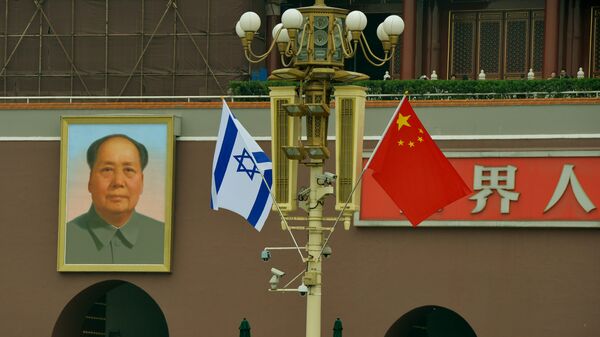After US President Donald Trump signed an initial trade agreement with Chinese officials, and Israel, one of the United States' closest allies in the Middle East, seems to want to follow in his footsteps. According to reports, talks on the free trade agreement that started as early as 2016 are supposed to conclude in 2020, boosting the flow of goods between the two countries.
China is Israel's No. 1 trade partner in Asia and No. 3 in the world (after the US and the EU), with bilateral trade reaching more than $13 billion in 2017.
Long Road to Partnership
But the road to this partnership has neither been easy nor short.
"The starting point of China-Israel relations was in 1950 when the Jewish state recognised the People's Republic of China. But those ties were kept on the back burner until 1979, when the Sino-Vietnamese war broke out," said Professor Aron Shai, the Pro-Rector of Tel Aviv University and one of Israel's leading experts on China.
Back then, China that was not doing well in the battlefield and in analysing the reasons behind its failure, realised that it needed ammunition to win that war.
The problem was that China's weapons were all Soviet-made, but turning to Moscow, which was supporting Vietnam, was not an option. Asking for Western arms was also off the table, as it presupposed investments that Beijing could not afford and more importantly, it required training, for which China didn't have the time.
"That's why Israel, which possessed Soviet weapons after capturing them from the Arab armies in the 1967 and 1973 wars and knew how to operate them, presented a good way out of the mess, simply because it could train the Chinese on how to use them and even upgraded some of the models to fit their needs."
Since then relations have continued to flourish, with the two countries establishing full diplomatic ties in 1992. However, it wasn't without some hiccups. Prior to 2000, Israel inked an arms deal with China, agreeing to supply it with several Phalcon air-borne early-warning radar systems. However, under immense American pressure, Israel's then-Prime Minister Ehud Barak had to call the deal off in 2000, angering the Chinese authorities and putting relations with Beijing at risk.
Friend or Foe?
Over the course of the years, Tel Aviv managed to iron things out, boosting cooperation with Beijing in several spheres, including construction.
In recent years, the China Civil Engineering Construction Corp. worked on a number of important projects including the digging of Israel's key tunnels, the construction of ports and even the country's light rail system in Tel Aviv.
If that's not enough, China has also purchased several Israeli companies including the Jewish state's largest food conglomerate Tnuva and the Alon Tavor power plant.
Tel Aviv has allegedly supplied Beijing with arms, including early warning and control systems, anti-tank guided missiles and many other technology -according to reports that have never been confirmed by Israel.
Apart from arms, cooperation was also boosted in the sphere of construction.
"There is a lot of criticism in the academy concerning the fact that the government doesn't consult experts when it comes to what repercussions such moves can entail," said Shai."Israel's Ministry of Finance is keen to strike such deals as they bring in money and bolster bilateral ties. But the security apparatus is largely concerned".
Israel has every reason to worry, the country's media speculates. By injecting billions of dollars into the country's economy, China might end up having a say, not only in the sphere of trade but also in political and security issues. Given Beijing's ties with the Arab world and with Iran, on which it relies for energy supplies, it is even more worrisome.
A year ago, the head of Israel internal security service, the Shabak Nadav Argaman, warned of Chinese involvement in Israel, saying "Chinese influence in Israel was particularly dangerous given their strategic investments in the country's economy," adding that legislation was needed to curb the spread of Beijing's influence.
The US too eyes with suspicion the growing ties between Israel and China. Washington is worried that Beijing's ultimate goal would be to chip away at America's influence in the region, the way they allegedly did in Africa and East Asia, reports suggest.
But Shai says Washington has no reason to worry. "Although Israel does play on two violins, maintaining good ties with both nations, at times of crises, the Jewish state knows that it can only rely on the US. So our allegiance lies first and foremost with America."


